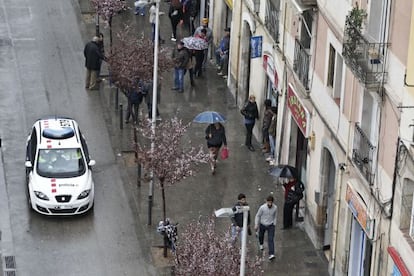Catalonia to keep record of personal data of prostitutes and their clients
Measure aimed at putting a stop to the roadside sex trade in the region


The government of Catalonia is going to create a central file with personal information about roadside prostitutes and their clients, including their full name, ID number, address, date of birth, nationality and “especially protected data (of a sexual nature).”
Authorities argue that having cars stop along the curb to secure prostitutes’ services poses a road safety hazard, and violates article 56.4 of the Road Law. The fine for occupying public roads for prostitution purposes is as high as 30,000 euros, both for the sex workers and their clients.
The government of Artur Mas, of the nationalist coalition CiU, aims to put a stop to roadside prostitution through this pioneering measure, which combines heavy fines with a permanent record of the offenders, including delicate information about their sex lives.
Authorities said that this information will be used “to collect information about complaints, handle the proceedings, take in the sanctions and extract information for statistical reports.”
“For this new type of sanction, we will need a file,” said a spokeswoman for the Catalan Department of the Interior.
The new legislation goes into effect on Wednesday, meaning that police could start handing out fines and collecting information right away.
The decision to keep a file with personal information has been approved by the Catalan Authority for Data Protection (APDCAT). In a report, the agency warned about the sensitive nature of the information, but gave the green light anyway.
“There can be no doubt that collecting information about certain people, like those who demand or supply sexual services in exchange for money, enables the identification of a person and his/her sexual profile, and can constitute a threat to the individual,” reads the report. “One need only think about the repercussions that such information could have on family life, work or an individual’s social image.” The APDCAT adds that this type of information can only be collected “for general interest reasons.” Yet the agency concludes that the Catalan government is entitled to pursue this initiative.
This is not the first time that this data-protection issue has caused controversy. The city of Barcelona was sanctioned by the same agency, the APDCAT, for making police officers jot down the ID and addresses of prostitutes and clients caught on the streets of the Catalan capital. Local authorities have appealed that decision. The difference between the two cases, it would seem, is that Barcelona’s initiative was based on a local bylaw, while the Generalitat’s decision is based on an actual law.
“Stigmatizing women”
Several associations and activist groups have condemned the decision by the Catalan government to keep sensitive details about people on file, especially about the sex lives of women.
“It’s just another way to stigmatize the women,” says Rocío Nieto, president of the Association for the Prevention, Rehabilitation and Assistance to Women in Prostitution.
“The issue is being approached as a problem for road safety, but then other types of information are being collected... We have to address this seriously, from the viewpoint of social problems,” adds Clarisa Velocci, spokeswoman for the prostitute support group Genera.
“What we’re particularly concerned about is that all this penalization and criminalization of prostitutes will eventually push them into hiding or into closed apartments, where there is no access to them and they become more vulnerable,” says Helga Flamtermesky, of a project called Mujer-Frontera.







































